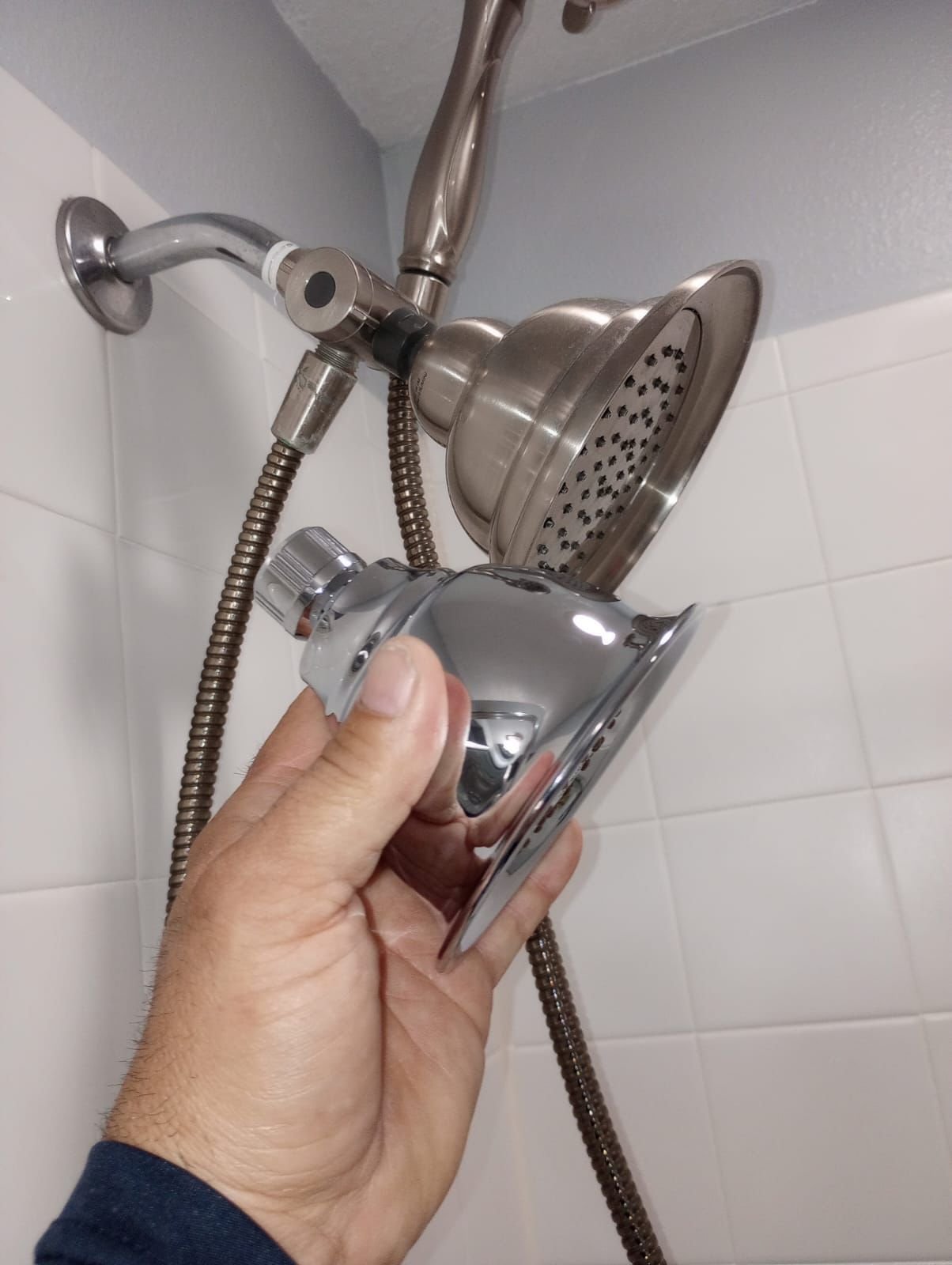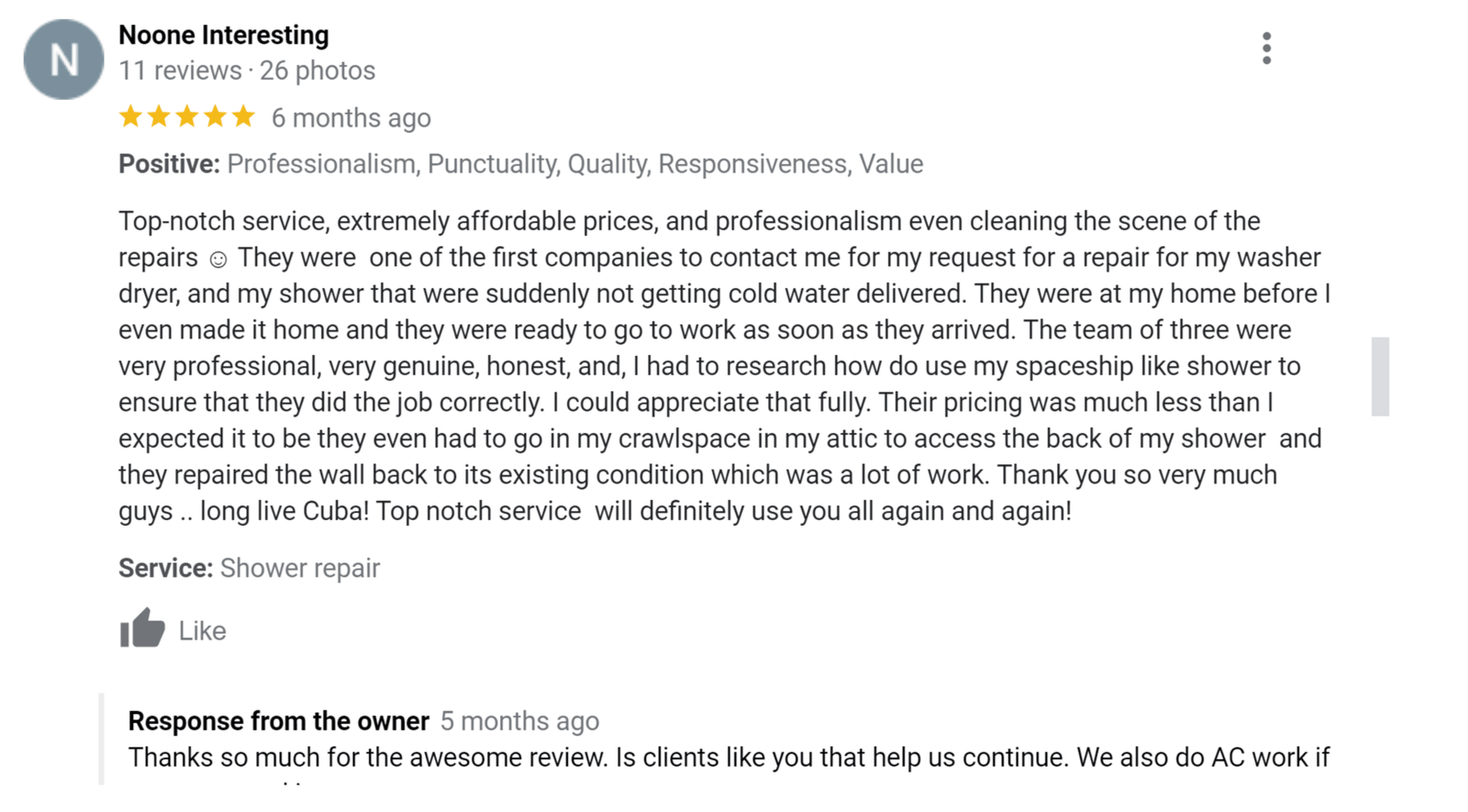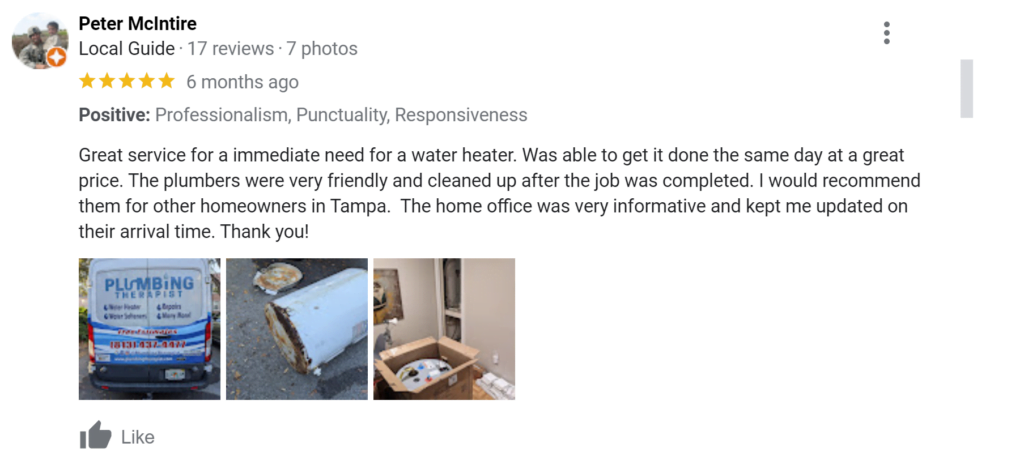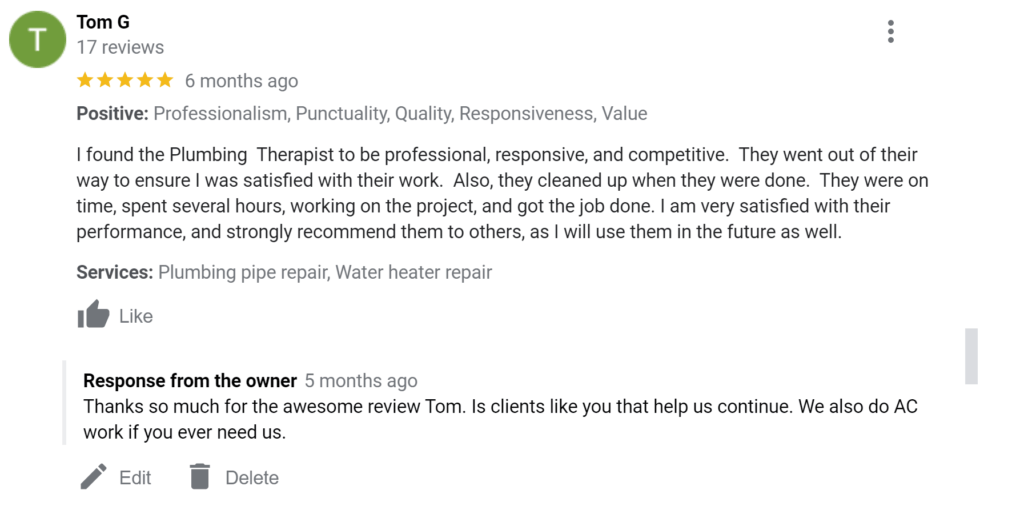Shower Unclogging
Shower unclogging is the process of removing blockages in your drain pipes, allowing water to flow freely again. At Plumbing Therapist, we specialize in this vital service. Our expert team uses advanced techniques and tools to clear obstructions efficiently. Whether it’s hair, soap scum, or debris causing the issue, we’ll diagnose and resolve it promptly.
Do You Need Our Help ?
Feel free to contact us now
$99 Water Heater Flush + Free Plumbing System Inspection
Shower Unclogging in Tampa Bay
Proven Shower Unclogging Services in Hillsborough County, Pinellas County, and Pasco County
Is your daily shower turning into a stressful experience due to slow drainage or standing water? At Plumbing Therapist, we understand the frustration that comes with a clogged shower. Our mission is to provide you with fast, effective, and affordable shower unclogging services that restore the tranquility to your bathroom.
Why Choose Plumbing Therapist for Shower Unclogging:
Expertise: Our team of experienced plumbers specializes in diagnosing and resolving shower drain issues. We’ve seen it all, from hair clogs to soap scum buildup, and we have the expertise to tackle any challenge.
State-of-the-Art Equipment: We use the latest plumbing technology and equipment to ensure efficient and thorough unclogging. This means minimal disruption to your daily routine and a shower that flows smoothly.
Prompt Response: We understand the urgency of a clogged shower, which is why we offer swift response times. Contact us, and we’ll schedule a convenient appointment to address your issue promptly.
Affordable Pricing: Plumbing Therapist believes in fair and transparent pricing. We provide upfront quotes with no hidden fees, so you know exactly what to expect.
Customer Satisfaction: Your satisfaction is our top priority. We take pride in our work and stand behind every job we do. We’re not satisfied until you are.
Say goodbye to the stress of a slow-draining shower. Let Plumbing Therapist be your trusted partner in restoring the flow to your bathroom. We’re just a call away, ready to provide expert shower unclogging services that leave you refreshed and worry-free.
Contact Plumbing Therapist today to schedule your shower unclogging service, and experience the joy of a smoothly flowing shower once again. Your plumbing solutions start here!

Why partner with Plumbing Therapist?
Quality, Affordability, and Expertise.

No Hidden or Unexpected Charges

Free Estimates & Online Booking Available

Professionally Trained Technicians

Honesty is Guaranteed

Quick Communication & Service Within 24 Hours

400+ 5 Star Reviews

Why is it important to unclog the shower?
Unclogging the shower is essential for several reasons:
Efficient Drainage: A clogged shower drain leads to slow or standing water, making your shower less enjoyable. Unclogging ensures efficient water drainage, allowing you to shower comfortably and save time.
Preventing Water Damage: Standing water in the shower can leak onto the bathroom floor, potentially causing water damage to tiles, grout, and even the subfloor. Regular unclogging prevents costly repairs.
Hygiene: Stagnant water can become a breeding ground for bacteria and mold, posing health risks. Unclogging the shower promotes a cleaner and healthier bathroom environment.
Longer Plumbing Lifespan: Clogs can place added stress on your plumbing system, potentially leading to pipe damage and corrosion. Unclogging your shower helps extend the lifespan of your plumbing fixtures.
Energy Efficiency: Slow drainage can result in water waste and increased energy costs due to longer showers. Proper drainage saves both water and energy.
Preventing Odors: A clogged shower drain can emit unpleasant odors as trapped water stagnates. Unclogging eliminates these odors, ensuring a fresher-smelling bathroom.
Maintaining Property Value: Regular maintenance, including shower unclogging, helps maintain your home’s value. A well-maintained bathroom is more appealing to potential buyers or renters.
Avoiding Emergency Repairs: Neglecting a clogged shower can lead to sudden plumbing emergencies, which can be costly and inconvenient. Preventive unclogging is far more manageable and budget-friendly.
Unclogging the shower is crucial for your comfort, hygiene, and the longevity of your plumbing system. It also helps prevent potential damage and costly repairs, making it a wise investment in the maintenance of your home.
If you would like more information, feel free to give them a call at (813)-437-4477 or you can book online and get their latest discount!
Customer Testimonials: Real Experiences with Plumbing Therapist
We proudly share the experiences and stories of our valued clients. Their feedback provides a glimpse into the quality of service and commitment to excellence we uphold at Plumbing Therapist. You'll read firsthand how our plumbing solutions have improved comfort and efficiency in homes across Tampa Bay. These testimonials illustrate our dedication to customer satisfaction and the difference our expert services can make.




Your questions answered
Common Shower Unclogging Questions:
What causes my shower drain to clog?
Shower drains can become clogged due to a variety of reasons. Here are some common causes of shower drain clogs:
Hair: One of the most frequent culprits is hair. As you shower, hair can accumulate in the drain, and over time, it forms a blockage.
Soap Scum: Soap and shampoo residues can combine with minerals in the water to create a sticky, soap scum buildup. This buildup can gradually narrow the drainpipe.
Mineral Deposits: In areas with hard water, mineral deposits like calcium and magnesium can accumulate in the drain, leading to clogs.
Dirt and Debris: Small particles of dirt and debris can wash off your body and down the drain, eventually causing a blockage.
Foreign Objects: Occasionally, small objects such as jewelry, bottle caps, or children’s toys can accidentally fall into the drain and cause clogs.
Lack of Drain Screens: Without a drain screen or guard, larger particles of debris, like food or large soap chunks, can enter the drain more easily.
Pipe Misalignment: In some cases, pipe misalignment or improper installation can create areas where debris accumulates and leads to clogs.
Aging Pipes: Over time, pipes can deteriorate and develop rough surfaces or rust, which can trap debris and contribute to clogs.
Tree Roots: In rare cases, tree roots can infiltrate underground drainpipes and obstruct water flow, causing clogs.
To prevent shower drain clogs, consider using a drain screen to catch hair and larger particles, and regularly clean your drain with safe methods like baking soda and vinegar. If clogs persist or become severe, it’s advisable to consult a professional plumber for thorough cleaning and maintenance.
Can I prevent shower drain clogs?
Yes, you can take several preventive measures to reduce the likelihood of shower drain clogs. Here are some tips to help you prevent shower drain clogs:
Use a Drain Screen: Install a drain screen or hair catcher in your shower drain. These inexpensive devices catch hair and larger debris, preventing them from entering the drainpipe.
Clean the Drain Regularly: Remove the drain cover and clean it periodically. Use a wire hanger or a long brush to reach down and remove any accumulated hair and debris.
Minimize Soap and Shampoo Residue: Use liquid soap and shampoos that leave less residue compared to bar soaps and thick, creamy products. This can help reduce soap scum buildup.
Flush with Hot Water: Once a week, pour boiling water down the drain to help dissolve soap scum and clear minor buildup. Be cautious when handling hot water.
Use Baking Soda and Vinegar: Occasionally, pour a mixture of baking soda and vinegar down the drain. Let it sit for a few minutes, then flush with hot water to break down residue.
Avoid Pouring Grease or Oil Down the Drain: Grease and oil can solidify in pipes and contribute to clogs. Dispose of these substances in the trash instead.
Keep Foreign Objects Away: Ensure that small objects like jewelry, bottle caps, or children’s toys don’t accidentally fall into the drain. Use a drain stopper when necessary.
Regular Plumbing Inspections: Schedule periodic plumbing inspections by a professional to check for any developing issues or blockages that may not be visible.
Manage Hard Water: If you have hard water, consider installing a water softener to reduce mineral buildup in your plumbing system, including the shower drain.
Be Mindful of What Goes Down: Educate household members about what should and shouldn’t be flushed down the drain, emphasizing the importance of proper disposal.
By following these preventive measures, you can significantly reduce the risk of shower drain clogs, ensuring a smoothly flowing shower and avoiding the inconvenience of clog-related issues.
Do I need to replace my shower drain if it frequently clogs?
Frequent shower drain clogs don’t necessarily mean you need to replace the entire drain. However, they could indicate an underlying issue that needs attention. Here are some steps to consider before deciding whether or not to replace the shower drain:
Professional Inspection: If your shower drain is frequently clogging, it’s advisable to have a professional plumber inspect the drain and the plumbing system. They can identify the root cause of the recurring clogs.
Clearing the Blockage: In many cases, frequent clogs are caused by the accumulation of hair, soap scum, or debris in the drainpipe. A plumber can use specialized tools to clear these blockages.
Pipe Maintenance: If the clogs are occurring deeper within the plumbing system, it may require maintenance or repair of the pipes themselves. This could involve cleaning or, in extreme cases, replacing a section of the pipe.
Upgrades or Modifications: Depending on the age and condition of your plumbing system, a plumber may recommend upgrades or modifications to improve drainage and reduce the risk of future clogs. This could involve installing a larger drain or making changes to the pipe layout.
Regular Maintenance: To prevent future clogs, consider implementing regular maintenance practices, such as using a drain screen to catch hair and debris and periodically cleaning the drain.
Chemical Solutions: Avoid using harsh chemical drain cleaners, as they can damage pipes. Instead, consult with a professional plumber for safe and effective solutions.
In most cases, a qualified plumber can address the issue causing frequent shower drain clogs without the need for a complete drain replacement. However, if the drain or pipes are severely damaged or corroded, replacement may become necessary. It’s essential to consult with a professional to determine the best course of action based on the specific circumstances of your shower drain problem.
How often should I have my shower drain inspected and cleaned?
The frequency of shower drain inspections and cleaning can depend on several factors, including the age of your plumbing system, water quality, and the number of people using the shower. Here are some general guidelines to help you determine how often you should have your shower drain inspected and cleaned:
Regular Maintenance: It’s a good practice to inspect and clean your shower drain periodically as part of your routine home maintenance. Doing so once every few months is a sensible starting point.
High Use: If your shower receives heavy use, such as in a household with multiple family members, you may need to inspect and clean the drain more frequently. Consider doing so every 1-2 months to prevent buildup.
Hard Water: If you live in an area with hard water, mineral deposits can accumulate more quickly in your plumbing. In such cases, inspecting and cleaning the drain every 2-3 months can help prevent mineral buildup.
Visible Signs: If you notice any signs of a clog, such as slow drainage or standing water, don’t wait for a scheduled maintenance. Address the issue immediately by inspecting and cleaning the drain.
Professional Inspection: It’s a good idea to have a professional plumber inspect your plumbing system, including the shower drain, on an annual basis. They can identify any potential issues and perform maintenance as needed.
DIY Maintenance: In addition to professional inspections, consider implementing DIY maintenance practices, such as using drain screens or catchers to prevent hair and debris from entering the drain.
Remember that these are general guidelines, and the actual frequency may vary depending on your specific circumstances. Regular maintenance and early intervention when you notice issues can help prevent major clogs and plumbing problems, saving you time and money in the long run. If you’re unsure about the right schedule for your shower drain maintenance, consult with a professional plumber for personalized guidance.
What can you use to unclog a shower drain?
You can use a variety of methods and tools to unclog a shower drain, depending on the severity of the clog and your preferences. Here are some effective options:
Plunger: A plunger can be highly effective for minor to moderate clogs. Make sure you use a flat-bottomed plunger designed for sinks and showers. Create a tight seal over the drain and perform quick, forceful plunges to dislodge the clog.
Drain Snake or Auger: A drain snake, also known as a drain auger, is a long, flexible tool designed to reach deep into the drainpipe. Feed it into the drain and turn the handle to break up and remove the clog.
Chemical Drain Cleaners: Chemical drain cleaners are available in liquid or gel form. Use them with caution, following the manufacturer’s instructions. Avoid using them if you have PVC pipes, as they can damage them.
Baking Soda and Vinegar: A natural and environmentally friendly method involves pouring a mixture of baking soda and vinegar down the drain. Let it sit for about 15 minutes, then flush with hot water to break up and wash away the clog.
Hot Water: For minor clogs caused by soap scum or grease, pouring boiling water down the drain can often dissolve the obstruction.
Homemade Drain Cleaner: Mix 1/2 cup of baking soda and 1/2 cup of salt, then pour it down the drain. Follow this with a mixture of 1 cup of vinegar and 1 cup of hot water. Let it sit for a few hours or overnight, then flush with hot water.
Enzyme-Based Drain Cleaners: These products contain beneficial bacteria that break down organic matter in the drain. They are safe for pipes and the environment and can be used as a preventive measure.
Professional Plumbing Services: For stubborn or recurring clogs, or if you’re unsure about the cause, it’s advisable to consult a professional plumber. They have the expertise and tools to address more complex clogs and potential underlying issues.
Remember to take safety precautions when using any method, and always follow the manufacturer’s instructions for chemical drain cleaners. If your shower drain remains clogged despite your efforts, or if you’re concerned about causing damage to your plumbing system, it’s best to seek professional assistance to resolve the issue safely and effectively.
How do plumbers unclog a shower?
Professional plumbers have various methods and tools at their disposal to effectively unclog a shower drain. Here’s an overview of how plumbers typically unclog a shower:
Assessment: The plumber starts by assessing the severity and cause of the clog. They may ask you about any symptoms you’ve noticed, like slow drainage or standing water.
Clearing Debris: Using a snake or auger, the plumber can reach deep into the drainpipe to physically break up and remove the clog. They might use different attachments on the snake, depending on the nature of the blockage.
Hydro-Jetting: In some cases, plumbers use hydro-jetting equipment, which involves a high-pressure stream of water to dislodge and flush away clogs, debris, and buildup from the drainpipe walls. This is particularly effective for stubborn or severe clogs and can also clean the pipes.
Chemical Solutions: Plumbers may use specialized chemical solutions, but these are typically different from over-the-counter drain cleaners. These solutions are often safer for pipes and more effective at dissolving clogs.
Camera Inspection: If the cause of the clog isn’t immediately apparent, plumbers can use a small camera attached to a flexible cable to inspect the inside of the drainpipe. This helps them identify the problem accurately.
Preventive Measures: Once the clog is cleared, plumbers may offer preventive measures to reduce the risk of future clogs. This can include installing a drain screen, providing maintenance tips, or recommending pipe repairs or upgrades if necessary.
Professional Expertise: Professional plumbers have the training and experience to assess the situation and choose the most appropriate method for unclogging the shower drain. They ensure the job is done safely and effectively, minimizing the risk of damage to your plumbing system.
It’s important to note that while there are DIY methods and tools available for unclogging, professional plumbers have the knowledge and equipment to handle more complex or stubborn clogs and to address any underlying issues that may be contributing to the problem. If you’re experiencing persistent or severe shower drain clogs, it’s advisable to consult a professional plumber to ensure a thorough and lasting solution.

